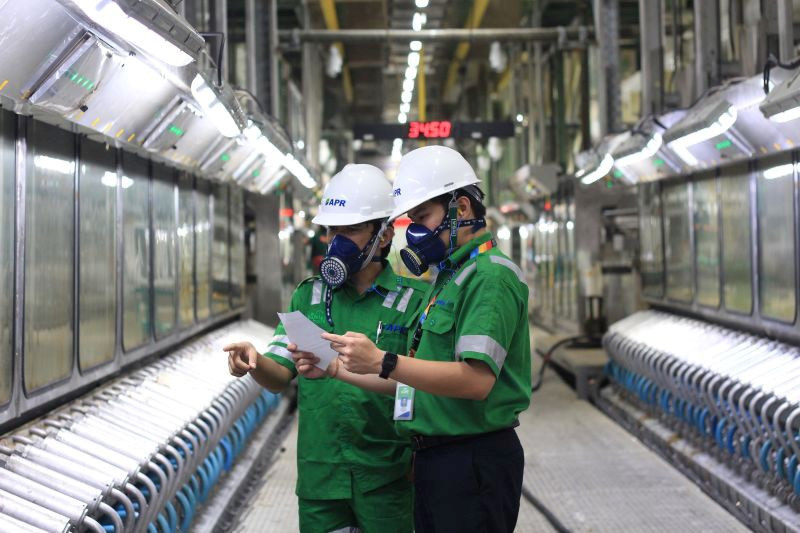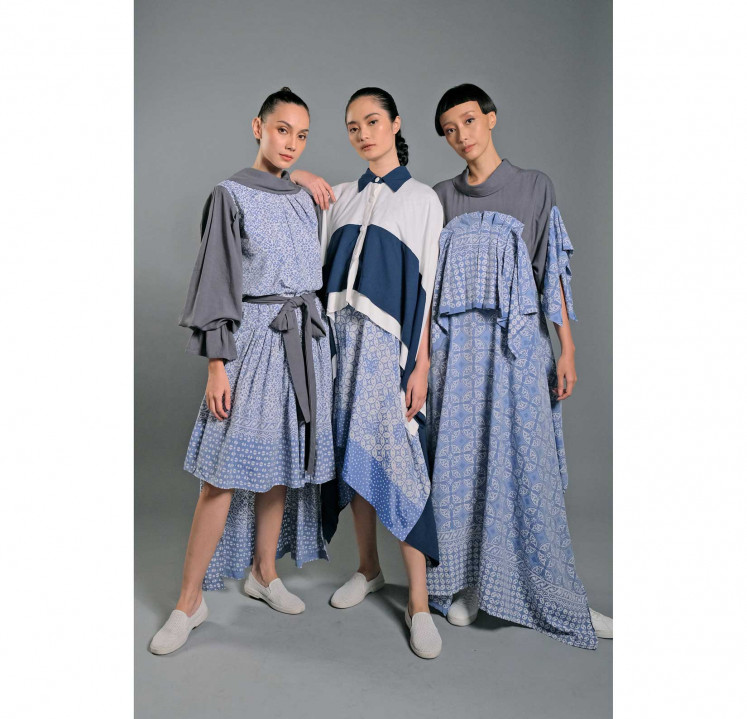Popular Reads
Top Results
Can't find what you're looking for?
View all search resultsPopular Reads
Top Results
Can't find what you're looking for?
View all search resultsResponsible viscose production: APR rolls out sustainability progress report
Change text size
Gift Premium Articles
to Anyone
A
sia Pacific Rayon (APR), Asia’s first fully integrated viscose rayon producer that sources its raw materials from a renewable industrial plantation, has just released its first sustainable development report on Nov. 16.
The sustainable development report covers APR’s business activities within its first 18 operational months in Indonesia, starting from January 2019 up to June 2020.
APR commits itself to become a leading viscose rayon producer that embodies principles of sustainability, transparency and operational efficiency, which serve the interests of the public and the nation, while giving value-added products to its individual and business customers alike.
The report, titled “Creating Sustainable Value: From Plantation to Fashion”, sought to break down APR’s sustainability efforts, which are focused on clean manufacturing, renewable sources and initiatives.
APR’s inaugural sustainability report revealed the company’s aim to reduce emissions from its viscose-making process. The company planned to recover over 90 percent of carbon disulfide from its production. In 2019, the average recovery rate was 89.2 percent, which was just a few steps closer to the target.
The Riau-based company stated that 90 percent of its energy consumption was from renewable sources, and it also recorded a drop in its waste intensity to 85.23 kg/ton VSF in the first half of this year from 95.99 at the end of 2019.
As for process water consumption, APR had improved efficiency, with 42.74 m3 per ton VSF of process water consumption in the first half of 2020, compared to 49.97 m3 per ton VSF in 2019. Meanwhile, the discharged wastewater also dropped to 25.60 mg/L in TSS (total suspended solids) in the first half of 2020, compared to 36.39 in 2019.
“In our first 18 months of business, we focused on establishing a strong operational foundation backed by a sustainability road map,” APR Director Basrie Kamba said.
Superior manufacturing
Specifically in the realm of sustainable manufacturing, APR has also obtained several certifications related to manufacturing, raw material sourcing and the kinds of products it puts out there.
APR is the first viscose producer in Indonesia that has received the STeP certification for compliance sustainable production processes. The certification process itself has already been internationally recognized by OEKO-TEX, the world’s best-known label for textiles tested for harmful substances.
APR products have also obtained various certifications for quality management, environmental system as well as for its work health and safety environment management system.
Furthermore, APR ensures 100 percent sustainably sourced dissolving wood pulp by providing full traceability of supply chain and following internationally recognized certification standards such as PEFCTM, FSC ® or equivalent.
APR sustainability policy, first published in 2018 and updated in 2020, also builds from its main supplier APRIL’s Sustainable Forest Management Policy (SFMP) 2.0, which commits to eliminate deforestation, protect fiber and peatland landscapes and support best practices in fiber plantation management.
Contributing to Indonesia and its local communities
As Indonesia’s leading integrated viscose producer, APR has also contributed to the national textile industry transformation, supporting Indonesia in making its “Industry 4.0” vision come true.
APR has also actively partnered with various local fashion stakeholders to promote viscose as a sustainable fashion enabler. It has also launched its Everything Indonesia initiative as a catalyst to revitalize Indonesia’s status as a global textile manufacturing hub.
In response to the COVID-19 pandemic, the company together with APRIL and Tanoto Foundation has also provided 15,000 hazmat suits, 150,000 medical face masks, as well as pairs of surgical gloves for the Riau chapter of the COVID-19 task force.
Moreover, the company has distributed household necessities packages to about 11,000 households across 176 villages in Pelalawan, Riau, whose dwellers have already been hit hard by the pandemic. In addition, APR has also produced 88,000 cloth masks and distributed them to employees, families and households in the surrounding areas.
“Innovation and collaboration will underpin the next stage of our efforts to advance sustainability in our industry. While we have made a good start, we have much more to do to raise the bar for sustainable textile production,” concluded Basrie.











